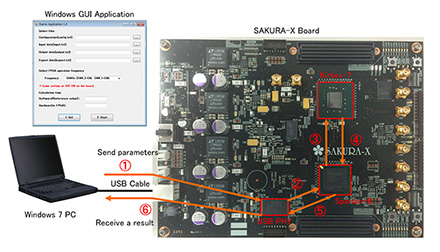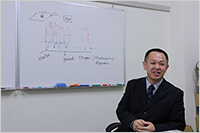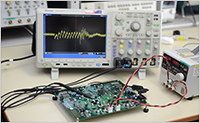Enlarge Image Hardware implementation of advanced cryptography and its security evaluation from the viewpoint of side channel information: On SASEBO, that is an security evaluation FPGA board, various pairing-based cryptographies are implemented on the board.
Enlarge Image Enlarge Image
Okadai is Japan’s leading university in IoT security
Yasuyuki Nogami, Associate Professor, Graduate School of Natural Science and Technology, Okayama University.
Advances in cybersecurity technology are important to meet the challenges of ensuring the safety and social acceptably of the proliferation of technology based cloud computing and internet of things (IoT).
Researchers at Okayama University are playing a central role in the development public-key internet security systems for data transmission. cybersecurity in particularly, RSA cryptography and elliptic curve cryptography for digital authentication of users and devices.
“Okayama University is Japan’s top academic institute in research on cybersecurity,” says Yasuyuki Nogami, head of the Okayama University Security Research Group. “In 2015 our cybersecurity group received the highest number of so-called ‘Kakken’ competitive research grants from Ministry of Education, Culture, Sports, Science and Technology (MEXT).”
Professor Nogami’s trained as a mathematician and has a doctorate in ‘finite field theory’ and the construction of so-called extension fields from additive and multiplicative perspectives. After joining Okayama University Nogami concluded that it was “difficult to eat with mathematics” and decided to apply his mathematical skills to developing advanced cryptography. “My expertise in discrete mathematics is proving to be invaluable for cryptography,” says Nogami. “Furthermore, I decided to set up the Okayama University Security Group to expand this area of research.” The Group consists of 16 members with backgrounds in pure sciences, engineering, and medicine.
Selection of ongoing projects on advanced cryptography and its applications
Algorithms and hardware for ‘secure cryptoprocessor’ with adjustable security levels
Professor Nogami and colleagues are developing an innovative ‘secure cryptoprocessor chip’ that can be programmed to match specific security levels—for example, high for protecting national secrets and not so high for protecting an online vending machine selling soft drinks. More specifically, the secure key length of RSA cryptography increases from 512, 1024, 2048, to 3072 bits, and accordingly, it is necessary to upgrade both the hardware and arithmetic architecture of cryptoprocessors to handle the increases in bit size.
The secure cryptoprocessor chip’ being developed by the Okayama group is the world’s first ‘adjustable security level secure cryptoprocessor’ offering variable security levels without requiring changes in the hardware. The Okayama University secure cryptoprocessor chip supports a wide range of recent cryptographic protocols including elliptic curve and paring-based cryptography. The secure cryptoprocessor can respond to security strengths between 256 to 5120 bits with elliptic curve and pairing-based cryptography. Notably, cryptoprocessor device is small in size and has a practical calculation efficiency.
This scalability of the chip is supported by the original idea of the Okayama group called cyclic vector multiplication algorithm (CVMA) that is used for vector multiplication but with the ability for wide ranging scalability for security parameters. The chip expected to find many applications including ubiquitous terminals and IoT devices.
Publication
Yasuyuki Nogami, et al, FPGA Implementation of Various Elliptic Curve Pairings over Odd Characteristic Field with Non Super Singular Curves, IEICE Trans. E99-D, No. 4, 805-815, (2016).
DOI: 10.1587/transinf.2015ICP0018

The SCOPE project—extracting passwords from electromagnetic noise from devices
Professor Nogami and colleagues have devised a method to extract the secret password for accessing personal computers and other such devices by analyzing the electromagnetic noise (em-noise) emanating from peripheral cables connected to the devices. The Okayama Security Group are leaders in this area of research in Japan.
This research requires expertise in the development of hardware, software, and mathematical algorithms.
High security communications for control systems
The development of secure and safe methods for controlling autonomous automobiles, medical robots for surgery, GPS information, images from compact CCD cameras and related sensors.
International collaboration
Professor Nogami and his colleagues at the Okayama Security Group are collaborating with the following groups overseas as part of the Super Global University Program.
San Jose State University, USA (Big data and cybersecurity)
INRAI, France (encryption)
Université de Rennes 1 (cryptographic mathematics)
Pusan University (encryption hardware)



